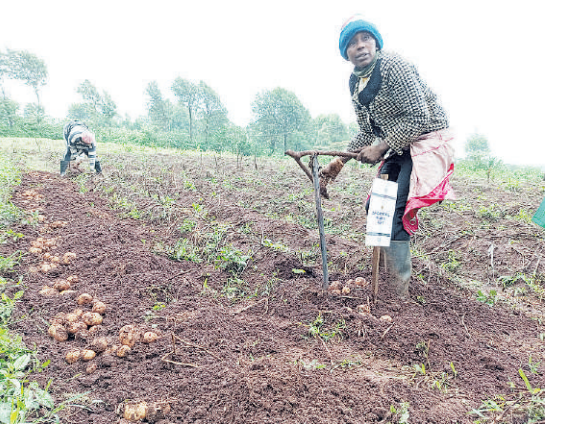
Potato farmers have urged the government to put more effort into producing certified seeds.
Speaking at Kalro Potato Research Centre in Tigoni, Kiambu county yesterday, they said what is available in the market is costly and inaccessible to most small-scale farmers.
“We plant potatoes as business and want good returns, but we have the challenge of certified seeds not being readily available to us,” Sammy Rotich, a potato farmer from Kuresoi, Nakuru county, said.
“We are forced to buy uncertified seeds, whose quality is low.”
Rotich said the Kenya Seed and Variety Act, which prohibits the sale of uncertified seeds, aggravates the situation as farmers are not able to share the seeds they have.
He urged the government to organise grassroots trainings for farmers to help them improve their harvests, while equipping them with the skills needed to address their challenges.
“Let the government draw nearer to us so it can understand the challenges we face and help us to face them,” Rotich said.
“Most farmers lack training and are not able to access extension officers to advise them. They rely on their own knowledge, which is usually limited.”
Fellow farmer Joseph Rono said the high costs of farm inputs eat into their profits, leaving them with meagre earnings.
“Fungicides and fertilisers have become expensive for farmers, who are also facing the shortage of certified seeds,” he said.
The shortage of seeds, he said, exposes farmers to exploitation as they scramble for what is available. Meanwhile, Kalro announced it has introduced a new high-yielding variety of potatoes that is droughtand disease-resistant.
Robert Musyoki, a director, said the new potato variety is at its final verification stage before it is released to farmers.
“Certified seeds play a crucial role in enhancing potato productivity. The new variety will address shortages and increase farmers’ yields,” he said.
The country has a huge demand for potatoes, and lack of sufficient seeds causes a huge imbalance in the demand and supply chains.
“This is why we have invited stakeholders to come together so we can enhance production of certified seeds that can withstand diseases and in the process, satisfy the demand for the crop,” he said.
The research centre’s director Moses Nyongesa said the new variety was necessitated by farmers’ request for high-yielding seeds that are drought-resistant.
He said researchers have used a new technology known as apical cutting. This is a potato seed production method that uses tissue culture plantlets to rapidly multiply seed potatoes to produce the new variety.
“This seed variety is currently available at Kalro and will address the challenge of certified seeds shortage in the market,” he said.
The new variety, he said, will reduce farmers’ dependence on chemicals and reduce their cost of production, thus increasing their earnings.
“We are yet to name the new variety because it’s still in the process of production, but we are calling it the IG-70,” he said.
“This is a very good variety that will help farmers get more proceeds.”
Nyongesa said constrained resources have hampered the centre’s bid to produce a high amount of certified seeds, necessitating the rooted apical cutting technology.
With the new seeds, farmers stand to harvest up to 120 bags of potatoes per acre with proper crop husbandry.
The seeds will cost Sh4,250 per
50kg bag. Farmers appealed for the
prices to be reviewed downwards to
make them affordable.


![[PHOTOS] Ruto at Pope Francis' burial](/_next/image?url=https%3A%2F%2Fcdn.radioafrica.digital%2Fimage%2F2025%2F04%2F844cb891-abd4-4ee5-bc2d-2a0c21fa3983.jpeg&w=3840&q=100)






